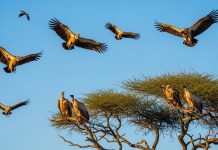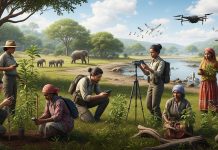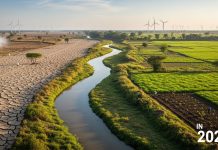A Sit-Down with Martins Egot, Executive Director of Panacea for Developmental and Infrastructural Challenges for Africa Initiative (PADIC-AFRICA), Formerly Known as Development Concerns (DEVCON). In the interview with Mike Abang, the discussion primarily revolved around various issues concerning the Cross River National Park and the Community forest. One key topic addressed was the government’s decision to grant licenses to two mining firms within the Cross River National Park. Regarding this, Abang expressed his sentiments in the following statement:
“Apart from the fact that the environmental organisation is very concerned about the environment of Cross River State and its forest communities, we have been in very close partnership with the Cross River National Park for over ten years now. They have been part of building the capacity of the community eco-guards that we train and support to take care of, manage and carry out surveillance and protection of community forests. The National Park has been very cooperative and they have been seeing results from our partnership but this same National Park is being encroached. For example, in Ofumkpa, where this mining activity is happening, for two years now we have been having joint patrols with the National Park officers, Rangers and the community eco-guards that we put together in Ofumkpa, and they have been protecting the forests together. But suddenly, we hear that there is a licence given to companies to mine, there is so much disaster in that place and for us, it is very disheartening.”
Abang also voiced his concerns for the National Park facing imminent mining. He highlighted that Cross River State has been in a prolonged struggle against deforestation, an ongoing challenge. The region has witnessed significant damage due to activities like timber exploitation and uncontrolled deforestation, resulting in severe environmental harm. Amidst this ongoing battle, three distinct forest management systems played pivotal roles: Community Forests, Government Reserves, and the last stronghold of conservation, the National Park.
The Sanctity of the National Park
During the interview, when asked about the mandate of the National Park, Martins emphasized its significance. Established under the National Park Service Act, the National Park serves as the ultimate guardian of its ecosystem. Its primary directive is straightforward: safeguard and foster the diverse array of life within its confines. However, despite explicit prohibitions against mining, trespasses continued, posing a fundamental threat to its sanctity. This quote underscores his claim:
“The National Park Service Act (2006) unequivocally underscores that national parks are sanctuaries meant exclusively for the propagation, protection and management of vegetation and wildlife. Notably, Section 22 of the Act delineates the functions of Management Committees, reinforcing the exclusive dedication of national parks to the propagation, protection and management of vegetation and wildlife.
Section 29 makes an offence for any unauthorised person to go into the National Park without the permission of the Conservator-General. Mining activities are explicitly prohibited in section 30(1) of the Act which says, a person who, unless authorised to do so under this Act or the regulations under this Act, carries out an undertaking connected with forestry, agriculture, grazing or excavation or does any levelling of the ground or construction or any act tending to alter the configuration of the soil or the character of the vegetation; or does an act likely to disturb the fauna or flora; or engages in drilling, mining, prospecting or exploration of any kind of natural resources, is guilty of an offence.
The National Park, therefore, has the mandate to manage and protect the National Park and the Federal Ministry of Mines and Steel Development should not in any way, give out leasing rights to any mining company in the National Park and they know this. We are trying to get to the appropriate authorities to ensure that this is reversed as soon as possible. As we speak, it is still happening in Ofumkpa.”
Martins Egot fervently believed that the National Park held the potential to not only sustain the ecological balance but also to benefit the state and its people economically. Responsible tourism, he argued, could transform the park into a source of sustainable revenue, bridging the gap between conservation and livelihoods. While dissenting voices questioned the tangible benefits of the National Park, Martins Egot understood that its true value transcended monetary reckoning. It was the lifeblood of a delicate ecosystem, a sanctuary for a myriad of species, each playing a crucial role in the intricate web of life.
Empathy for Communities
Martins Ergot spoke on the threat these actions have to the communities. He said: “Yes. At some point, we pity them and want to reason with them, even though they are not completely right. I have been engaging directly with the Ofumkpa people, we have been working closely and they have been part of our patrols, listening closely to our conservation debates and discussions and they participate. When this happened, we took them on and they said they were accepting these people because they were promising roads, schools, employment and little stipends for working with them at the mining site. These are the things that pull and push communities to be part of it and we do not blame them, it is life survival as a community; because these communities neither have good roads nor schools and the people there are very poor. Our governments that are supposed to be supporting communities with all these amenities are not forthcoming. Again, the National Park Authority which is supposed to be empowered to engage well in these communities and provide for the communities, is not doing that. We talk about livelihood but what degree of livelihood projects are we pushing to these community people? We empathise and sympathise with the community people and so in that direction, I will be calling on the Federal and state governments, even international NGOs to intervene.”
A Call for Collaborative Action
Martins Egot’s wisdom echoed through the trees, urging governments and NGOs to join hands with the communities. Building bridges, he believed, was the key to safeguarding both the cherished lands and the livelihoods of those who called them home. The battle for the Cross River National Park continues, a testament to the unwavering spirit of those who dare to stand as guardians of the forest. In this emerald realm, voices rise in unison, unwavering in their commitment to preserve this natural wonder for generations.

















